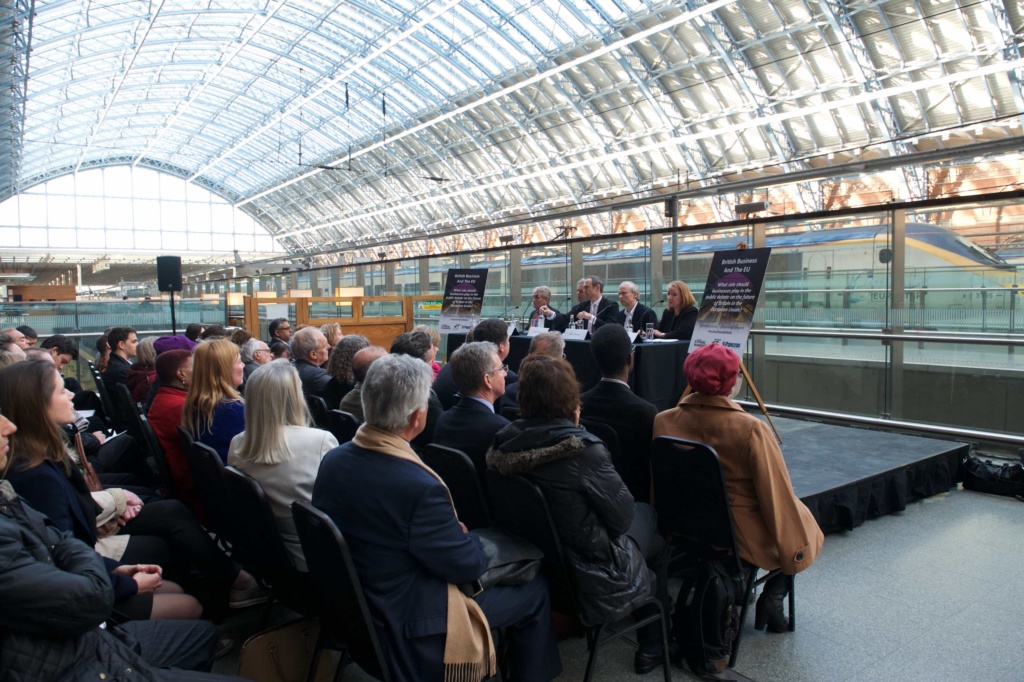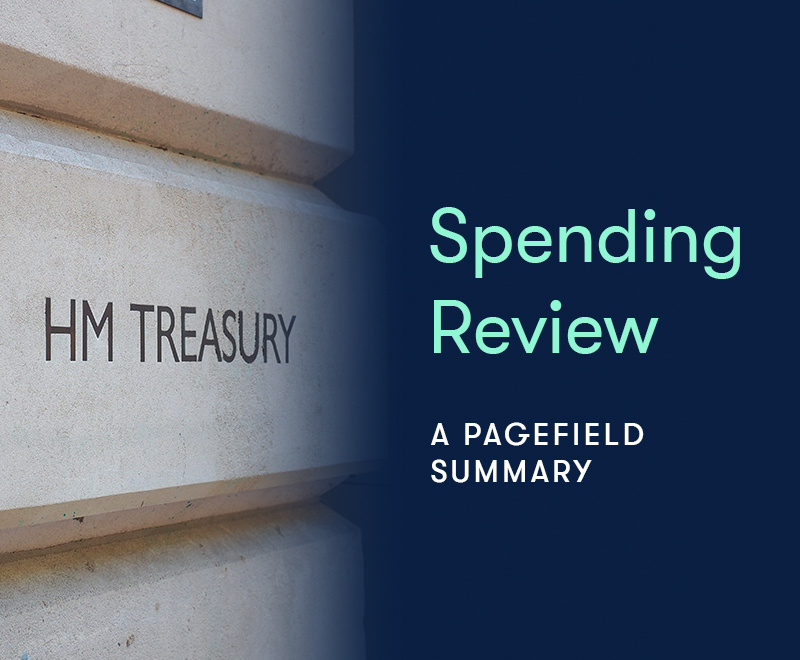British Business and the EU – What role should businesses play in the public debate about Britain in the European Union?
On Wednesday evening, HS1 and the Evening Standard partnered to host a debate at St Pancras International about the role that British businesses should play in the wider public debate about Britain’s relationship with the European Union. The relationship between Britain and Europe is something that is, of course, of significant importance to HS1 and the need for a healthy and effective relationship between the two is essential for the future economic success of HS1, London and the UK. St Pancras is a symbolic representation of Britain’s links to the continent and it was a superb location for what was a fascinating discussion of what are set to be some of the most pressing issues in UK politics, post-election.
Nicola Shaw set the scene for the assembled guests – numbering some 80 readers of the Evening Standard and corporate guests of HS1 – highlighting how St Pancras is living up to its recognition as a ‘Great Place’ by the Academy of Urbanism by hosting events such as these, along with Sound Connections and Terrace Wires and a host of other great initiatives. She then handed over to James Ashton, Executive Editor of the Evening Standard, who outlined that the idea of ‘Britain in Europe’ is currently being drowned out in the election campaign – but that the parties are clear in what they want, insofar as both ultimately desire to stay in, but only the Tories want a referendum.
Ashton then introduced the panellists; Deborah Mattinson, Founding Director of Britain Thinks; Luke Johnson, Chairman of Risk Capital Partners; Peter Wilding, Director of British Influence and Sir Christopher Meyer, former British Ambassador to the US.
Deborah Mattinson was the first to speak, suggesting that polls show that the public is entirely split on whether to stay in Europe or not – a significant shift from three years ago, where the numbers wanting to stay “dwarfed” their opponents. She highlighted that the ‘stay in’ camp wins when the jobs figures and risks are understood, but the ‘leave’ camp succeeds when it is able to effectively emphasise the negative impact of immigration.
Luke Johnson warned of the dangers of “ever closer union”, suggesting that EU citizens do not want this and the majority of them have never had the choice. He added that the arguments for trade being central to staying in are undone when you take into account the fact that most businesses (90 per cent by his estimation) in the UK don’t actually trade with Europe.
Peter Wilding, Director of a group calling for Britain to remain in a reformed EU, suggested that the EU has undoubtedly changed since the 1970s, but so has the World and Britain needs a seat at the high table – something which only EU membership can provide. He went further than the other panellists in arguing that business needs to talk about more than just money and jobs when discussing the EU – it should be emphasising the values of this country and a vision for the future. Wilding feels that the EU is gradually changing and actually shifting according to British influence, “we’d be mad to leave”.
Sir Christopher Meyer opined that we have to look at the UK’s wider stakeholders – the USA and China see Britain as a springboard into Europe. He was highly sceptical of Britain’s, and Cameron’s, ability to re-negotiate and noted that “ever-closer union” has always been the point of the EU – our leaders are misleading us when they suggest that it isn’t.
When the debate opened up between the panel there was a heated exchange between Peter Wilding and Luke Johnson as to whether the UK really has the ability to change the European Institutions – with Wilding arguing that it has already succeeded in doing so. Johnson suggested that that idea was “bulllshit” and that British businesses in the City, most notably private equity firms like his, had been badly hit by the EU and Britain had been powerless to act. Johnson went on to add that businesses will be less complacent than in the Scottish Referendum and that having the debate (regardless of the outcome) will ultimately be beneficial in the future.
Sir Christopher noted that Cameron’s policy has played badly in the US who are very afraid of the idea that Britain might leave – the US see such an idea as an “act of self-mutilation”. The British public, he felt, are blamed by politicians for not understanding the wider debate and the case for staying in, but it is a complex issue and very hard to describe in plain English. It is unlikely, he added that the public will be enthused by a referendum on the issue.
Deborah Mattinson implored business leaders to more passionately make the case for Britain staying in Europe. Politicians are fundamentally mistrusted by the public in a way that business leaders are not, and they should harness this capital to spell out the benefits and ultimately highlight the risks of leaving – that is what will cut through. Wilding agreed, noting that some of Britain’s most successful moments in treaty negotiations in Europe haven’t cut through to the public.
The debate moved on to how Britain compares with other countries in its attitude to working with Europe. On this subject, Sir Christopher came up with perhaps the best soundbite of the evening – noting that the French and Germans agree with decisions in Brussels but then add their own spin, taking a “yes, but” approach. An approach that is in direct contrast with Britain’s “no, because” stance that wins us few friends and creates only hostility. He went further, suggesting that we must attempt to quantify the risk to British business of any retaliatory EU tariffs should we choose to leave.
Sir Christopher and Luke Johnson both agreed on the idea that should Britain leave, we may well lose a few banks from the City, but ultimately they would now be able to effectively set their own regulation – an issue on which Britain persistently suffers defeat in Europe currently.
Following some questions from the audience on the issue of immigration (which Peter Wilding suggested was a Westminster problem being portrayed as a European one by our politicians) the debate drew to a close with the panel firmly divided on how businesses should interact on the debate, and whether they should actively take a side. There was agreement however, that the issue is one that must be discussed and it is important to have debates such as this, and that post-election we can expect it to dominate our politics.



